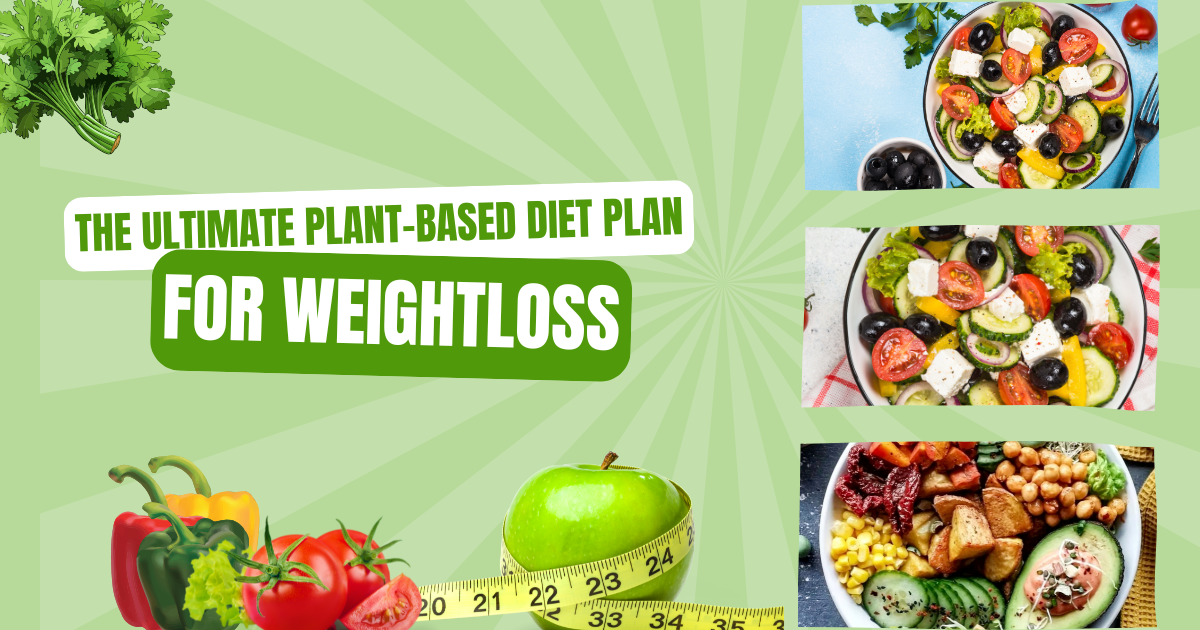Introduction: Why Plant-Based Diets Are Rising in Popularity
In recent years, plant-based eating has transformed from a niche lifestyle into a global health trend. With rising concerns about obesity, chronic illness, and low energy levels, people are turning to plant-based diets as a sustainable solution for weight loss, improved health, and increased energy.
But what makes this approach so powerful? Unlike restrictive fad diets, a plant-based diet emphasizes nutrient-dense whole foods that naturally support weight management while fueling the body with steady energy. Whether you’re looking to shed pounds, boost endurance, or simply feel more vibrant, adopting a plant-based lifestyle can be a game-changer.
Understanding the Plant-Based Diet
What does plant-based mean?
Vegetables, fruits, whole grains, legumes, nuts, and seeds are the mainstays of a plant-based diet, which minimizes or completely avoids animal products.
Difference between plant-based and vegan diets
While both approaches avoid animal products, veganism is a philosophy rooted in ethics, excluding all animal-derived items (including honey, leather, etc.). A plant-based diet focuses more on health and may occasionally include small amounts of animal foods, though many choose to avoid them entirely.
Core Principles of a Plant-Based Diet
Emphasis on whole, minimally processed foods
The foundation of plant-based eating is whole foods—rich in fiber, antioxidants, and micronutrients. This means choosing oats instead of sugary cereal, lentils instead of processed mock meats, and fresh fruits over packaged snacks.
Balance of macronutrients
- Carbohydrates: Complex carbs like quinoa, brown rice, and sweet potatoes provide steady energy.
- Protein: Beans, lentils, tofu, and tempeh build and repair muscle.
- Healthy fats: Avocados, chia seeds, and nuts support hormones and satiety.
Portion control and mindful eating
Even on a plant-based diet, portion sizes matter. Optimizing outcomes requires mindful eating, which involves paying attention to hunger signals and refraining from overeating.

Benefits of a Plant-Based Diet for Weight Loss
Low-calorie density and satiety
Plant-based foods are often lower in calories yet higher in volume and fiber, meaning you can eat more and feel satisfied while still losing weight.
Boosted metabolism and fat burning
Studies show that diets rich in whole plant foods may increase metabolism and promote fat loss, thanks to their thermogenic effect.
Sustainable and long-term results
Unlike crash diets, plant-based eating is sustainable. It promotes healthy habits that you can maintain for life.
Plant-Based Foods that Boost Energy
Complex carbs for steady fuel
Sweet potatoes, quinoa, brown rice, and oats all offer sustained energy without causing blood sugar increases.
Plant proteins for muscle repair
Chickpeas, black beans, tofu, tempeh, and seitan ensure your body recovers properly from workouts.
Healthy fats for endurance
Omega-3-rich foods like walnuts, flaxseeds, and chia seeds help reduce inflammation and keep energy levels stable.
7-Day Plant-Based Meal Plan for Weight Loss and Energy
Day 1–3: Balanced energy meals
- Breakfast: Almond milk, chia seeds, fruit, and overnight oats
- Lunch is quinoa salad with corn, avocado, and black beans.
- Supper will be brown rice, mixed vegetables, and stir-fried tofu.
Day 4–5: High-protein focus
- Breakfast: Tofu scramble with spinach and mushrooms
- Lunch: Lentil soup with whole-grain bread
- Dinner: Tempeh tacos with salsa and cabbage slaw
Day 6–7: Detox and recovery meals
- Breakfast: Green smoothie with spinach, banana, and flaxseeds
- Lunch: Buddha bowl with chickpeas, sweet potatoes, and tahini dressing
- Dinner: Vegetable curry with quinoa and lentils
Best Plant-Based Protein Sources
Legumes and lentils
Excellent sources of fiber and protein, they help regulate blood sugar and keep you full.
Tofu, tempeh, and edamame
Soy-based proteins are versatile, nutrient-dense, and ideal for muscle recovery.
Nuts, seeds, and whole grains
Packed with protein, healthy fats, and minerals that support overall health.
Essential Nutrients to Watch On a Plant-Based Diet
Vitamin B12
Because plants do not naturally contain large amounts of B12, fortified diets or supplements are essential.
Iron and zinc
Legumes, pumpkin seeds, and fortified cereals help meet your needs, though pairing with vitamin C improves absorption.
Omega-3 fatty acids
Flaxseeds, chia seeds, walnuts, and algae supplements provide plant-based omega-3s.
Plant-Based Diet and Exercise Performance
Fueling pre-workout meals
Carbohydrate-rich meals like oatmeal with fruit provide quick fuel before workouts.
Post-workout recovery nutrition
A banana, almond butter, and plant protein powder smoothie promotes muscle repair.
Common Mistakes to Avoid on a Plant-Based Diet
Relying too much on processed vegan foods
Vegan junk food (burgers, cookies, fries) may be plant-based but won’t support weight loss or energy.
Not getting enough protein
Ensure each meal includes a protein source like beans, tofu, or lentils.
Skipping variety in meals
A narrow diet can lead to nutrient gaps. Incorporate different vegetables, grains, and proteins.
Grocery List for Plant-Based Beginners
Fresh produce essentials
Spinach, kale, broccoli, bananas, apples, carrots, bell peppers.
Pantry staples
Quinoa, oats, lentils, beans, brown rice, almond butter.
Snacks and quick-prep foods
Hummus, roasted chickpeas, nut bars, trail mix.
Plant-Based Recipes for Weight Loss and Energy
Breakfast: Smoothie bowl
Blend frozen berries, banana, spinach, and almond milk. Top with granola and chia seeds.
Lunch: Buddha bowl
Mix quinoa, roasted sweet potatoes, chickpeas, kale, and tahini dressing.
Dinner: Lentil stew
Simmer lentils, tomatoes, carrots, and spices for a hearty, nutrient-rich dish.

Plant-Based Diet and Mental Wellbeing
Reduced inflammation and mood balance
Whole plant foods are anti-inflammatory, which supports brain health and mood stability.
Improved sleep quality
Nutrients like magnesium (from leafy greens and nuts) promote deeper, more restful sleep.
FAQs on Plant-Based Diet for Weight Loss and Energy
Q1: Can I lose weight quickly on a plant-based diet?
Yes, many people see rapid weight loss due to lower calorie density and higher fiber intake.
Q2: Does a plant-based diet require supplements?
Vitamin B12 and omega-3 supplements are recommended for most people.
Q3: Can athletes thrive on a plant-based diet?
Absolutely—many elite athletes perform at their best on plant-based nutrition.
Q4: Will I feel tired without meat?
Not if you eat balanced meals with complex carbs, protein, and iron-rich foods.
Q5: Is a plant-based diet expensive?
Not necessarily—staples like beans, rice, and vegetables are often more affordable than meat.
Q6: Can kids and seniors follow a plant-based diet?
Yes, with proper planning, plant-based diets are safe and beneficial for all ages.
Conclusion: How to Thrive on a Plant-Based Lifestyle
The ultimate plant-based diet plan for weight loss and energy is more than a diet—it’s a lifestyle shift that nourishes the body, mind, and spirit. By focusing on whole, nutrient-dense foods, you’ll not only shed unwanted weight but also unlock consistent energy, improved health, and long-term sustainability.
Whether your goal is weight management, peak performance, or simply living a healthier life, a plant-based diet provides the foundation to thrive. The key is balance, variety, and mindful eating.
👉 Ready to transform your health? Start with simple swaps, stock up on nutrient-rich foods, and fuel your body with the power of plants.

